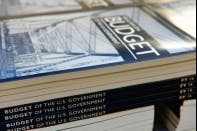Obama spending plan includes ‘generous’ six-year infrastructure program
A new budget plan by the Obama administration includes $478 billion dollars for transportation projects, but the half-trillion dollar question is whether a Republican Congress will get behind the pay-for: a new tax on corporate profits overseas.
The ambitious construction program is part of the president’s $4 trillion budget for 2016, released Monday.
The six-year plan is an expansion of the White House’s Grow America act, a transportation and jobs bill first proposed a year ago and largely ignored on Capitol Hill. With the current federal transportation spending plan set to expire in May, however, a consensus is building on the importance of a long-term program to fund the nation’s highways, bridges, ports and transit systems.
The transportation priorities in the new Obama budget proposal focus on safety, closing the “infrastructure deficit” and modernizing the transportation system using technology and innovation, according to the explanatory outline by the U.S. Dept. of Transportation.
The money designated for federal highway programs would grow from $41 billion this year to $54.4 billion by 2021, a 33% increase. Transit dollars would jump from $10.9 billion to $20 billion (83%). The plan also calls for increasing federal funds for rail service investments from $1.4 billion to $4.75 billion (239%). The pool for DOT-controlled TIGER infrastructure investment grants would jump from $500 million this year to $1.25 billion in each of the next six years.
The budget includes a new line item: $18 billion over six years for a multi-modal freight program designed to strengthen America’s exports and trade, and to give freight stakeholders "a meaningful seat at the table" in selecting funded projects. The new initiative would encourage better coordination of planning among the federal government, states, ports, and local communities, DOT says.
To supplement the failing Highway Trust Fund, which comes from the federal tax on gasoline and diesel, the Obama plan would impose a new, one-time tax on the foreign earnings of U.S. corporations. The 14% levy is expected to generate $238 billion, nearly matching the gas tax collection. Additionally, the president’s plan would close the loophole that allows corporations to avoid taxes on those overseas earnings, while lowering the rate that those companies have not been paying.
Republicans in Congress have offered similar proposals, but favor voluntary “repatriation” of overseas earnings at a reduced tax rate. More broadly, conservatives dismissed Obama’s 2016 budget proposal, with several noting its appearance on Groundhog Day and referring to the long winter of higher taxes ahead.
Senate Budget Committee Chairman Mike Enzi (R-WY) and House Budget Committee Chairman Tom Price, M.D. (R-GA) issued joint statement, characterizing the nation’s fiscal path as “unsustainable” because of “failed policies” and “stale thinking.”
“That’s why it’s so disturbing that President Obama has submitted yet another budget proposal that is focused on the same tired agenda that has failed to deliver for American families. The president is advocating more spending, more taxes and more debt,” the congressional budget leaders said. “A proposal that never balances is not a serious plan for America’s fiscal future. Especially when we have to borrow money just to afford the programs we already have.”
Still, the American Society of Civil Engineers, which has given U.S. infrastructure a D+ grade, called the Obama plan “particularly generous.”
In a blog post Monday, ASCE – which, as do many transportation and business groups, supports an increase in the gas tax as the simplest solution for a stable source of highway funding – suggests “if enacted, this proposal would allow for increased program certainty for the short-term while Congress continues to debate identifying a long-term, sustainable funding fix the program.”
Similarly, the American Association of State Highway and Transportation Officials (AASHTO) commended the proposal.
“We applaud the president and his administration for their leadership that has set the stage for a serious discussion about the next surface transportation bill,” said Bud Wright, AASHTO executive director. “We know the hardest conversations will involve how to fund infrastructure investments. We look forward to working with the President and Congress on developing a new transportation bill supported by a long-term, sustainable source of funding.”
About the Author
Kevin Jones 1
Editor
Kevin has served as editor-in-chief of Trailer/Body Builders magazine since 2017—just the third editor in the magazine’s 60 years. He is also editorial director for Endeavor Business Media’s Commercial Vehicle group, which includes FleetOwner, Bulk Transporter, Refrigerated Transporter, American Trucker, and Fleet Maintenance magazines and websites.

